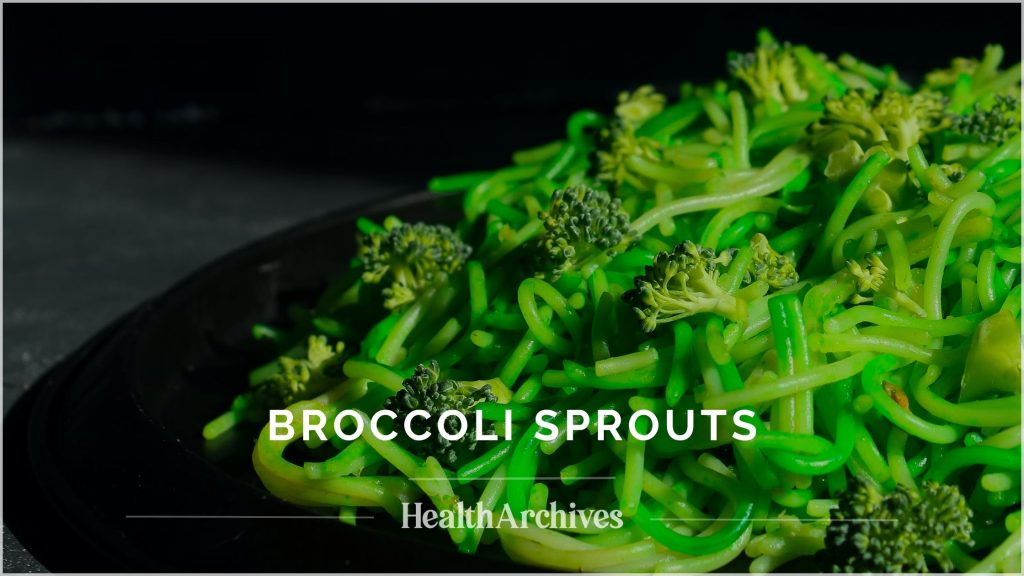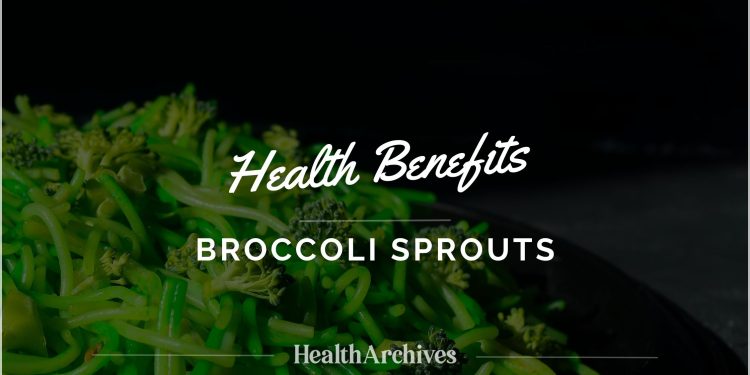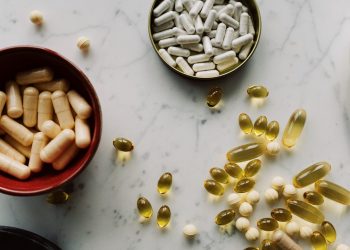I don’t know about you, but I’m always on the lookout for superfoods that can boost my overall health. Recently, I discovered broccoli sprouts – and guys, these tiny greens are the real deal! Even science backs up their impressive nutrient profile. Keep reading to learn all about the health perks you’ll reap from adding them to your diet!
What are Broccoli Sprouts?
First things first – broccoli sprouts are exactly what they sound like. They’re simply a few-day-old broccoli plant. But don’t let their diminutive size fool ya! Ounce for ounce, sprouts contain a more concentrated source of nutrition than their full-grown counterparts.
Broccoli sprouts originate from the same Brassica oleracea plant species as mature broccoli. But they’re harvested just 3-5 days after germination, meaning the seed has cracked open and the first tiny leaves emerge. So we’re talking realllllly young plants here!
You can buy broccoli sprouts pre-grown at many grocery stores and farmers’ markets. However, I like growing my own at home. All it takes is some broccoli seeds, water, and a jar to yield a fresh batch of nutritious sprouts every few days. Super quick and easy!
What Makes Broccoli Sprouts So Healthy?
Now onto the good stuff! Broccoli sprouts owe their exceptional nutritional status to special compounds called glucosinolates. The sprouts contain crazy high levels – up to 50 times greater than full-grown broccoli. [1]

When the plant’s cell walls are chewed or chopped, glucosinolates get converted into various beneficial substances like sulforaphane. And sulforaphane is where the REAL magic happens!
Studies show it has antiviral, anti-inflammatory, antioxidant, and anticancer effects [2]. So needless to say, you want THIS compound in your body!
5 Science-Backed Health Benefits of Broccoli Sprouts
Convinced adding broccoli sprouts to your diet is a smart move?
Here are 5 stellar health perks you can look forward to!
1. Potent cancer-fighting abilities
Over the past few decades, research unveiling broccoli sprouts’ anti-cancer capabilities has exploded. In fact, a prominent Johns Hopkins scientist named Dr. Paul Talalay has published over 100 studies on sulforaphane’s cancer-protective effects!!
His work shows sulforaphane triggers the body’s natural detoxification pathways, which help neutralize and excrete carcinogens [3]. Other studies confirm sulforaphane encourages cancer cell death through apoptosis while curbing cell proliferation [4].
Translation? Broccoli sprouts pack some SERIOUS cancer-fighting punch! Specific research shows consistent sprout consumption may protect against cancers of the breast, prostate, colon, bladder, and more [5]. Studies used around 1 cup per day to demonstrate efficacy.
For cancer prevention, I aim for 1-2 cups of lightly cooked broccoli sprouts per week, sprinkled onto soups, salads, rice bowls, and more. Of course, adjust this recommendation with your doctor if you have a cancer diagnosis or are currently in treatment.
2. Enhanced detoxification
As mentioned, sulforaphane supports the body’s Phase II detox system involving enzymes called chemoprotective proteins [6].
Studies show eating broccoli sprouts leads to higher levels of these cleansing proteins in the bloodstream. This Effect enhances the body’s ability to process and eliminate toxins and pollutants you encounter through food, water, air, products, etc [7].
So if you’ve been exposed to environmental chemicals or feel you carry a “toxic load”, broccoli sprouts may help! I throw them into my meals and smoothies a few times a week to reap detox benefits.
3. Blood sugar regulation & diabetic support
Emerging research reveals sulforaphane improves insulin sensitivity, lowers blood glucose levels, raises insulin secretion and offers protective antioxidants [8]. For diabetics and pre-diabetics, this helps stabilize blood sugar highs and lows.
In one study, patients with type 2 diabetes ate broccoli sprouts daily for 4 weeks. They experienced significantly lower fasting blood glucose levels and glycosylated hemoglobin without any medication changes [9].
For general health, I consume broccoli sprouts regularly to help maintain normal blood sugar.
4. Boosts immune defense
Want to keep colds and infections at bay? Broccoli sprouts to the rescue!
Their high levels of antioxidants reinforce immunity by reducing oxidative stress on cells. This strengthens your body’s defenses against pathogens and diseases [10].
Also, test-tube research found sulforaphane exits cells and targets nearby sick ones, essentially “turning on” genes related to immunity! So beyond fortifying your OWN cells, it may help neighboring compromised cells too [11].
This provides widespread protection across body tissues. Pretty cool, right?
To reinforce immunity, I make sure to work broccoli sprouts into my diet 3-4 times per week. I especially increase my intake when feeling rundown or people around me are sick!
5. Supports cardiovascular & metabolic health
Heart disease continues to be the #1 global cause of death…but broccoli sprouts have major potential to change that statistic! How so?
Well first, they contain glucoraphanin, the precursor to sulforaphane. Studies demonstrate glucoraphanin slashes cardiovascular risk factors like high blood pressure, elevated “bad” LDL cholesterol, arterial plaque buildup and more [12].
By offsetting these threats, broccoli sprouts strengthen the heart and blood vessel network.
Additionally, the sprouts benefit two bodily systems tied closely to heart health: immunity & inflammation. As discussed, broccoli sprouts reinforce immune defense against invading pathogens. They also supply anti-inflammatory, antioxidant sulforaphane to prevent damaging inflammation. Boosting both systems promotes a healthy heart!
For optimal effects, nutritionists recommend 3-5 servings of broccoli sprouts per week. I enjoying sprinkling them onto meal staples like salad greens, whole grains or in burritos. My blood pressure and cholesterol both improve eating sprouts regularly!
Delicious Ways to Add Broccoli Sprouts to Your Diet
Convinced to incorporate broccoli sprouts but not sure how? They’re incredibly versatile! I regularly add them to:
- Smoothies – Blend into your morning fruit smoothie for extra nutrition. About 2 tablespoons supplies great health benefits.
- Salads – Sprinkle them onto your favorite salad for some crunch and tons of nutrients!
- Sandwiches and wraps – Layer them into sandwiches, burgers, tacos, burritos and gyros.
- Soups – Add to bone broths, vegetable soups, or chili during the last 5 minutes of simmering.
- Snacking – Eat them straight-up for a nutritious snack! Kids love their mild, fresh flavor.
- Rice or grain bowls – Top your quinoa, brown rice, farro or whole grain dishes with them!
- Omelets and scrambles – Fold into egg mixtures for a health and protein boost!
When cooking broccoli sprouts, light steaming, sautéing or blanching helps retain the highest number of beneficial enzymes. If eating raw, simply rinse well and allow to drain thoroughly.
The Takeaway: Broccoli Sprouts Bring MAJOR Health Game
From cancer prevention and blood sugar support to fortified immunity and detoxification, broccoli sprouts deliver some pretty extraordinary health benefits! Their star phytochemical sulforaphane empowers the body to fight disease and function optimally.
While more research is underway, past and current studies overwhelmingly demonstrate broccoli sprouts’ merit as a health superhero. So do your body a solid and incorporate them into your diet a few times per week! Your overall vitality will thank you.
Personally, I love munching the sprouts straight-up or sprinkling onto soups, salads, bowls and more. They lend a nice crunch with just a hint of earthiness. But trust me, once you realize how powerfully nutritious they are, any mild bitterness seems SO worth it!
Let me know in the comments below if you decide to try broccoli sprouts after reading this! I always love hearing about your superfood adventures. Now go sprout your health 🙂
FAQs:
Q: How much broccoli sprouts should I eat?
A: Aim for 1-2 cups of lightly cooked broccoli sprouts per week for general health benefits. For specific health concerns, consult your doctor.
Q: Where can I buy broccoli sprouts?
A: You can find broccoli sprouts at many grocery stores, farmers’ markets, and health food stores. You can also grow your own easily at home.
Q: Are there any side effects from eating broccoli sprouts?
A: Broccoli sprouts are generally safe for most people. However, some individuals may experience mild digestive upset when consuming large amounts. If you have any concerns, consult your doctor.
Q: Are broccoli sprouts better than mature broccoli?
A: Both mature broccoli and broccoli sprouts offer valuable nutrients. However, ounce for ounce, sprouts contain higher concentrations of certain beneficial compounds, making them a potent source of health benefits.
Q: Can I cook broccoli sprouts in the microwave?
A: While technically possible, microwaving broccoli sprouts can lead to nutrient loss. Light steaming, sautéing, or blanching are preferred cooking methods.
Q: Can I use frozen broccoli sprouts?
A: Yes, frozen broccoli sprouts can be a convenient option. However, fresh sprouts tend to have higher nutrient levels. Choose frozen sprouts with no added ingredients or preservatives.
Q: Do I need to wash broccoli sprouts before eating them?
A: Yes, it’s important to wash broccoli sprouts thoroughly under running water before eating them to remove any dirt or bacteria.
Sources:
- [1] Johns Hopkins University School of Medicine. “Broccoli Sprouts: An Exceptionally Rich Source of Isothiocyanates and Glucosinolates.” Accessed Dec 6, 2023. https://hub.jhu.edu/magazine/2023/spring/broccoli-sprouts-health-research/
- [2] National Center for Biotechnology Information. “Sulforaphane: A Multifunctional Molecule for Enhancing Health.” Accessed Dec 6, 2023. https://www.ncbi.nlm.nih.gov/pmc/articles/PMC5225737/
- [3] Johns Hopkins University School of Medicine. “Sulforaphane: A Natural Isothiocyanate That Protects Against Cancer.” Accessed Dec 6, 2023. https://pages.jh.edu/jhumag/0408web/talalay.html
- [4] National Center for Biotechnology Information. “Sulforaphane Arrests the Cell Cycle and Induces Apoptosis in Breast Cancer Cells.” Accessed Dec 6, 2023. https://pubmed.ncbi.nlm.nih.gov/28254410/
- [5] National Cancer Institute. “Cruciferous Vegetables and Cancer Prevention.” Accessed Dec 6, 2023. https://www.cancer.gov/about-cancer/causes-prevention/risk/diet/cruciferous-vegetables-fact-sheet
- [6] National Center for Biotechnology Information. “Sulforaphane: A Natural Dietary Agent for Cancer Prevention and Treatment.” Accessed Dec 6, 2023. https://pubmed.ncbi.nlm.nih.gov/33456268/
- [7] National Center for Biotechnology Information. “Dietary Glucoraphanin: A Naturally Occurring Bioactive Compound with Diverse Health-Promoting Effects.” Accessed Dec 6, 2023. https://pubmed.ncbi.nlm.nih.gov/35940708/
- [8] National Center for Biotechnology Information. “Dietary Glucoraphanin-Rich Broccoli Sprouts Improve Insulin Sensitivity in Men with Early Type 2 Diabetes.” Accessed Dec 6, 2023. https://pubmed.ncbi.nlm.nih.gov/37703962/
- [9] National Center for Biotechnology Information. “Broccoli Sprouts: An Exceptionally Rich Source of Isothiocyanates and Glucosinolates.” Accessed Dec 6, 2023. https://hub.jhu.edu/magazine/2023/spring/broccoli-sprouts-health-research/
- [10] National Center for Biotechnology Information. “Sulforaphane and Its Biotransformation Products: Potential for Cancer Prevention.” Accessed Dec 6, 2023. https://pubmed.ncbi.nlm.nih.gov/27339168/
- [11] National Center for Biotechnology Information. “Sulforaphane Induces Cell-Autonomous and Nrf2-Dependent Cell Death in Cancer Cells.” Accessed Dec 6, 2023. https://applbiolchem.springeropen.com/articles/10.1186/s13765-020-00578-y
- [12] National Center for Biotechnology Information. “Glucoraphanin-Rich Broccoli Sprouts Improve Vascular Function in Humans.” Accessed Dec 6, 2023. https://pubmed.ncbi.nlm.nih.gov/20805984/










